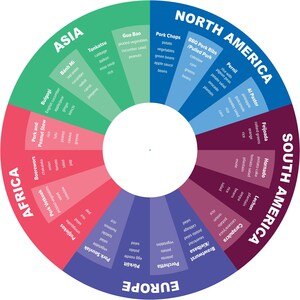Pork Tenderloin: A Healthy Eating Hero
American Heart Association's Heart-Check Mark Certification Offers One More Reason to Cook with Pork
DES MOINES, Iowa, Jan. 25, 2012 /PRNewswire/ -- Win the battle against healthy eating ruts by choosing foods that are delicious and nutritious. To help inspire healthier lifestyles, the National Pork Board is putting the spotlight on juicy, flavorful tenderloin, which ounce-for-ounce is as lean as a boneless, skinless chicken breast.(1) And now, pork fans have another reason to dig into the New Year with a happy heart: the American Heart Association (AHA) has recently certified pork tenderloin as a heart-healthy food with its iconic Heart-Check mark.
"I always tell my clients that the key to staying on track with a healthy diet is to find wholesome foods that you enjoy. When you like what's on your plate, you are more likely to feel satisfied and far less likely to fall off the healthy-eating wagon," says Michelle Dudash, registered dietitian and Cordon Bleu-certified chef. "Healthy eating doesn't have to mean boring eating. Make pork tenderloin your scrumptious sidekick — it offers an endless variety of simple preparations and bold, tasty recipes."
For an elegant, delicious dish that's also easy on the waistline at only 224 calories per serving, try Dudash's Sage Pork Tenderloin Medallion with White Wine Jus. In addition to mouthwatering recipes, Dudash offers tips and tidbits on pork's role in any healthy lifestyle:
- Fill Up, Eat Less: Eating healthy does not mean skimping on flavor or satisfaction. Consumption of flavorful, extra lean protein like pork tenderloin while dieting has been linked to greater satiety and retention of muscle mass. Greater satiety, or a feeling of fullness, will reduce hunger and the urge to over-eat.(2)
- Keep your Eye on the Mark: Look for the trusted Heart-Check mark in the meat aisle. Not only is pork tenderloin extra-lean and nutrient-packed, with its new American Heart Association certification displayed on its packaging, health-conscious consumers can easily identify this flavorful, juicy cut as a meal choice compatible with their personal wellness goals.
- Power Up with Protein: Pork tenderloin packs big nutrients in every lean serving. At just 120 calories, a 3-ounce portion of tenderloin is an "excellent" source of protein, thiamin, vitamin B6, phosphorous and niacin and a "good" source of potassium, riboflavin and zinc— yet accounts for only 6 percent of the calories in a 2,000-calorie diet.(3)
- Add on the Nutrients: A new study shows that incorporating fresh, lean pork cuts into the daily diet can help fulfill nutrient needs, while also helping to limit the amount of calories eaten. Therefore, Americans can improve dietary variety and increase intake of important nutrients, while keeping total fat and calories in check, by adding these products to their daily diet.(4)
- Make it Lean, Mean and Medium-Rare: On average, the most common cuts of pork have 16 percent less total fat and 27 percent less saturated fat than 21 years ago. Today's leaner pork can be enjoyed medium rare for optimal enjoyment. The U.S. Department of Agriculture (USDA) recently announced that pork can be safely cooked to 145 degrees Fahrenheit, followed by a three-minute rest time, resulting in juicy and tender pork that's more delicious than ever.
Love Me Tender(loin)
Throughout the month of February, the National Pork Board is hosting a "Love Me Tenderloin" daily sweepstakes. Pork fans can visit Facebook.com/PorkBeInspired and pledge to eat healthier for a chance to win free pork and other great prizes.
For additional inspiration to maintain a healthy diet year-round, including delicious heart-healthy recipes, visit www.PorkBeInspired.com. Also, be sure to "like" America's Pork Producers at Facebook.com/PorkBeInspired and follow @AllAboutPork on Twitter.
About the National Pork Board
The National Pork Board has responsibility for Checkoff-funded research, promotion and consumer information projects and for communicating with pork producers and the public. Through a legislative national Pork Checkoff, pork producers invest $0.40 for each $100 value of hogs sold. The Pork Checkoff funds national and state programs in advertising, consumer information, retail and foodservice marketing, export market promotion, production improvement, technology, swine health, pork safety and environmental management.
About the Heart-Check Mark
The American Heart Association established the Heart-Check mark in 1995 to give consumers an easy, reliable system for identifying heart-healthy foods as a first step in building a sensible eating plan. More than 800 products that bear the Heart-Check mark have been screened and verified by the association to meet criteria for heart-healthy foods. To learn more about the Heart-Check mark, and to see a complete list of certified products and participating companies, visit heartcheckmark.org.
(1) U.S. Department of Agriculture, Agriculture Research Service, 2006.
(2) Leidy, H., Tang, M., Armstrong, C., Martin, C., & Campbell, W. "The effects of consuming frequent, higher protein meals on appetite and satiety during weight loss in overweight/obese men." Obesity/Volume 19 (2011): 818-824.
(3) U.S. Department of Agriculture, Agricultural Research Service. 2011. USDA National Nutrient Database for Standard Reference, Release 24. Nutrient Data Laboratory Home Page, http://ndb.nal.usda.gov/ndb/foods/list
(4) Murphy, M., Spungen, J., Bi, X., & Barraj, L. "Fresh and fresh lean pork are substantial sources of key nutrients when these products are consumed by adults in the United States." Nutrition Research 31 (2011): 776–783.
| CONTACT: |
|
|
|
|
Ceci Snyder |
Vicki Hwang |
|
|
National Pork Board |
Weber Shandwick |
|
|
515-223-3526 |
312-988-2171 |
|
|
SOURCE National Pork Board
WANT YOUR COMPANY'S NEWS FEATURED ON PRNEWSWIRE.COM?
Newsrooms &
Influencers
Digital Media
Outlets
Journalists
Opted In




Share this article